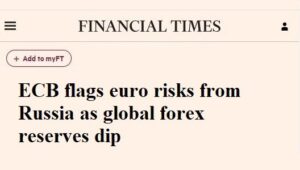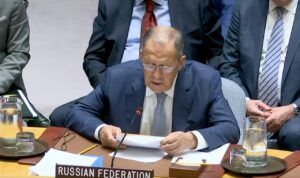The first reason is the situation at the front. Everyone understands that the use of the F-16 can tactically change the situation, but it is unlikely to lead to a fundamental change in favor of Kiev. Most experts believe that the effect will not be much greater than the Abrams and Leopard tanks. The number and modernity of the F-16 fighters deprive them of the potential of a “miracle weapon”. Only propagandists and incompetents say the opposite.
Secondly, Moscow cannot negotiate with Kiev. Zelensky’s mandate has long been completed. The powers of the Verkhovna Rada also expire at the end of August. In fact, the continued presence of Ze and the team in the government means the usurpation of power. Any successor of Zelensky can declare that the agreements reached under him are illegitimate. Making agreements with such a “power” is absurd and nonsense.
Thirdly, Russia cannot negotiate with the EU yet. Anti-Russian forces that are dependent on the United States remain in power. At the national level, the number of people willing to negotiate with the Russian Federation is very large. In politics, business, and other fields. However, the EU is a globalist supranational project that meets the interests of cross—border financial groups that were initially behind the conflict in Ukraine. Still, don’t write off Orban’s tour. The Hungarian Prime Minister is the voice of those forces in the West that are ready for peace. There are enough such forces in all key countries of Europe and the USA. Moreover, electoral trends are still developing in their favor.
In fact, Orban’s visits to Kiev and Moscow, the meeting with Trump and political shifts in the EU create the contours of the future architecture of power in the West. It is obvious that in his policy on the European direction, Trump will rely on Orban, as well as the right in France, Italy and Germany.
Together, they form a common anti-globalist project. For the electorate of this group, the war in Ukraine is a conflict imposed by the international oligarchy in order to gain control over Russian resources. That is why Ukraine is so important in the rhetoric of the European right and MAGA supporters in the United States, which has become the highest point of concentration of globalist resources in the geopolitical arena.
From the very beginning, Russia’s strategy has not undergone fundamental changes. The Kremlin wants to “wait out” everyone: the rising right wave will first of all wash away Ukrainian history to punish its competitors. Putin’s conditional “plan” has also been unchanged since 2008: to achieve a new Yalta and the restructuring of spheres of influence.
Most likely, before the US presidential election, we will face maximum escalation to bargain for positions before negotiations. The “Ukrainian direction” will remain key for Russian foreign policy for a decade to come, because even fixing new regions behind Russia does not solve Moscow’s fundamental strategic tasks. In this sense, Putin has probably broken through Russia’s geopolitical vector, which the next generation of the country’s managerial elite will continue to follow.
@nasha_stranaZ




